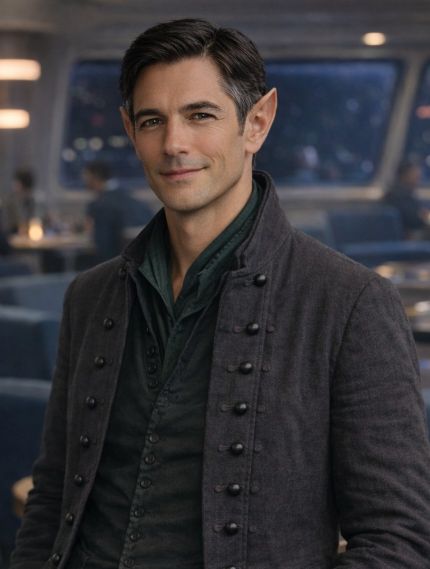Tavrek Harland
Name Tavrek Harland
Position Translation Specialist
Character Information
| Gender | Male | |
| Species | Human-Vulcan hybrid | |
| Age | 44 |
Physical Appearance
| Height | 185cm | |
| Weight | 84.5kg | |
| Hair Color | Black, lightly greying at the temples | |
| Eye Color | Grey-green | |
| Physical Description | Tavrek Harland stands just over six feet tall, lean and long-lined, his strength contained and measured rather than built for bulk. He moves with quiet precision, inhabiting space with deliberate economy, conveying discipline without austerity. His face is long and refined, shaped by Vulcan symmetry softened by Human variance. High cheekbones and a narrow jaw give definition without severity, and his features read as composed and intentional. His ears carry a subtle Vulcan point, restrained rather than pronounced. His eyes are pale grey-green, deep-set and observant, often seeming to weigh intent more than words. At rest, his expression tends toward seriousness, not coldness but controlled composure. His hair is dark, worn in a practical Human cut with natural wave, with grey beginning to show at the temples. He leaves it visible without comment, the grey lending quiet gravitas.  |
Family
Personality & Traits
| General Overview | Tavrek Harland moves through the world with quiet intention. His presence is steady, calm, and often noticed only in hindsight. He listens more than he speaks, not from shyness but from care. When he does speak, his words carry weight. He does not seek attention, yet he often anchors a room without trying. Raised by a Vulcan mother and a Human mother, Tavrek learned that truth is not always spoken aloud and that emotion can be powerful even in stillness. He has never fully belonged to either culture, but lives in the balance between them, feeling deeply and controlling those feelings with quiet discipline. His restraint is not denial. It is choice. As a civilian translation specialist, Tavrek works in nuance. He speaks over a dozen languages, but his real skill lies in understanding what people mean, not just what they say. He is trusted for his discretion, his clarity, and his ability to name the emotional shape of a moment without disrupting it. Off duty, Tavrek is reserved but warm. His humor is dry, often subtle, and usually lands after the moment has passed. He holds small talk lightly and shares silences easily. With friends, his expression softens and his affection is shown through quiet consistency. He will make tea without asking, notice when someone is tired, or adjust the lights before anyone thinks to ask. And he will share stories to distract, or enrich, when needed. His rituals ground him. When unsettled, he prepares kas’for-ila, a Vulcan tea blended by hand. The process is slow, the scent earthy and mineral-rich. It is an act of reflection, not escape. |
|
| Strengths & Weaknesses | Strengths: - He understands what people mean even when they do not say it. - He moves easily through complex cultures and emotional terrain. - He remains calm and grounded in tense or uncertain situations. - He sees patterns and emotional shifts others might miss. Weaknesses: - He often waits too long before speaking or taking action. - He keeps his emotions private, which can make him seem distant. - He avoids direct conflict, even when it may be necessary. - He carries his own pain quietly and rarely shares it. - He finds it difficult to ask for help, even when he needs it. |
|
| Ambitions | To prevent avoidable harm by helping people understand one another: before mistranslation becomes conflict, and silence becomes loss. | |
| Hobbies & Interests | Tavrek spends his quiet hours mapping linguistic drift in endangered languages, refining semantic frameworks to preserve meaning lost through trauma. He blends Vulcan teas by hand, never using a replicator. His favourite is kas’for-ila, a mineral-rich infusion taught to him by his mother. He bakes a traditional flatbread with rye, dill, and cardamom when overstimulated. He rarely eats more than one piece, leaving the rest out for others. When stillness fails, he runs. No music, no artificial terrain. Just movement, breath, and reset. He collects small stones from every world he visits and arranges them in ordered patterns. It is not art, but structure. He continues personal research into extinct dialects, working from fragments and forgotten phonetics. Tavrek listens to ambient field recordings: Vulcan wind, Bajoran rain, the groan of old ship hulls. Not music, but memory. He often plays them while working or cooking. For quiet challenge, he prefers printed Earth crosswords, especially cryptics in Scots or Scandinavian styles. One clue can hold him for hours. |
| Personal History | Tavrek Harland was born in 2344 aboard An’ael Station, a Federation scientific outpost orbiting Theros IV. Co-managed by Vulcan and Human teams, the station served as both research facility and cultural bridge. His birth was quietly celebrated in two homes shaped by different worlds. His parents, Sakra of Vulcan and Dr Nina Harland, a Human, met during a joint linguistic research initiative. Their collaboration evolved into a formal bond. They raised Tavrek within both traditions, prioritising clarity, respect, and choice. His childhood was structured and solitary, shaped by ritual and observation. From Sakra, he learned discipline and precision. From Nina, nuance and emotional fluency. He was raised bilingual and exposed early to Federation Standard, High Vulcan, and the tonal cues of unspoken feeling. By age seven, he could read three alphabets and had begun to study intent beneath language. There were no siblings, few playmates: but his world was full. Field notes, corridors, and the stillness of tea with either parent taught him to listen before speaking. That habit never left him. Between ten and fifteen, Tavrek honed his identity. He enrolled in a multi-species preparatory programme for diplomatic and scientific families. He excelled in linguistics and problem-solving. Praise meant little; precision mattered more. By eleven, he had begun a personal language journal, mapping the emotional patterns beneath speech. Sorrow softened grammar. Guilt shifted structure. Grief altered rhythm. Suus Mahna training continued, though running soon replaced it as his preferred form of focus. Socially, he was liked but seldom pursued. Those who broke through found dry humour, quiet loyalty, and steady warmth. Between fifteen and eighteen, Tavrek refined his sense of self. He focused on language and emotional inference, not politics. While others sought diplomacy or command, he studied the failures of meaning. At sixteen, he entered a civilian Federation mentorship, shadowing interpreters and contributing to early peace lexicons. This period also clarified his sense of attraction. Tavrek was drawn to stillness over spark; people, especially males, who moved with presence rather than performance. When he told his mothers, one smiled. The other made tea. There was no conflict. Only recognition. Romantic experience was rare. What mattered was trust before touch. At eighteen, he declined both Starfleet and the Vulcan Science Academy. Instead, he accepted a place at the University of Mitra V, a civilian institution for cultural translation and post-conflict studies. He left home with one bag, two journals, and gifts from each parent. He gravitated toward professors who specialised in fragile peace zones. He published early, refining trauma-aware translation methods. Field placements brought him to volatile regions where meaning was hard to maintain. At twenty-three, a mistranslated phrase on Janoor II led to violence. Tavrek caught the error too late. It stayed with him. He shifted into intelligence-adjacent work: cultural parsing, transmission analysis, and linguistic audits. He became known for brief, exacting reports and a refusal to politicise meaning. He formed a few lasting bonds. One, with analyst Harin, burned briefly but deeply. Harin died during a failed diplomatic handoff. Tavrek never spoke of him again. At twenty-seven, he accepted a civilian post alongside Starfleet Intelligence. He would not wear the uniform, but he would serve. During the Dominion War, Tavrek read messages. Intercepts. Surrender orders. Silence. At thirty, he was based on Starbase 192, analysing Dominion rhetoric and escalation cues. He learned to read death in six syllables. By late 2373, he travelled with mobile intelligence teams, helping survivors reconnect meaning. His role was triage: not just of language, but of grief. When asked if he would join Starfleet, he answered, “I don’t want to give the order to walk into fire. I want to help them understand why not to.” He never sought command. Only clarity. In 2374, a mistranslated evacuation beacon led to 1,417 civilian deaths. He found the error too late. It became the centre of every refinement he made after. By war’s end, Tavrek had contributed to forty-six debriefings, supported seventeen cultural reconstructions, and developed tools still used in peacekeeping today. He returned altered. He spoke less. Ran more. Brewed his tea by hand. The war did not take his voice, but it taught him what words could do. He chose to remain. In the decade that followed, Tavrek continued his work across Federation border regions and support stations. He was posted where communication was fragile, often among refugees and fractured treaties. His presence shifted rooms. His reports influenced decisions. He lived quietly. No long-term partnerships. A few enduring friendships. He exchanged brief, annotated correspondence with his surviving mother, Sakra. Every post added a new stone to the pouch in his drawer. There were moments of light; a year teaching junior officers, a friendship with a Tellarite linguist. By 2385, Tavrek worked with the Cultural Integration Division, designing communication frameworks for early-stage engagement. It was good work. But not his. In 2387, after a failed cultural handoff, not his mistake, but one that echoed, he requested reassignment. He asked for a ship. Something smaller. Fixed. Human-scale. He was cleared and posted to the USS Guinevere, embedded in the Diplomatic Department as a civilian Translator Specialist. |


